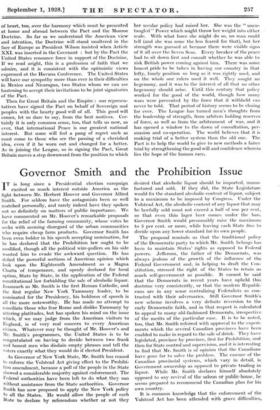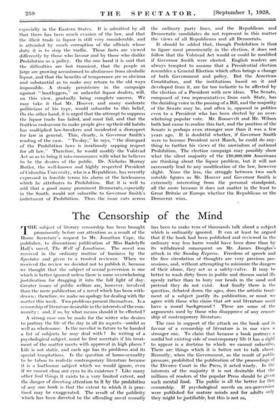Governor Smith and the Prohibition Issue
IT is long since a Presidential election campaign excited so much interest outside America as the fight-between Mr. Herbert Hoover and Governor Alfred Smith. For seldom have the antagonists been so well matched personally, and rarely indeed have they spoken out so definitely on matters of public importance. We have commented on Mr. Hoover's remarkable proposals for the relief of the farming community, whose votes he seeks with seeming disregard of the urban communities who require cheap farm products. Governor Smith has been even bolder in his speech accepting nomination, for he has declared that the Prohibition law ought to be modified, though all the political wire-pullers on his side wanted him to evade the awkward question. He has defied the powerful sections of American opinion which look upon the Eighteenth Amendment as a Magna Charts of temperance, and openly declared for local option, State by State, in the application of the Federal constitutional law forbidding the sale of alcoholic liquor. Inasmuch as Mr. Smith is the first Roman Catholic, and the first regular New York Tammany leader, to be nominated for the Presidency, his boldness of speech is all the more noteworthy. He. has made no attempt to conciliate those who fear Rome and dislike Tammany by uttering platitudes, but has spoken his mind on the issue which, if we may judge from the American visitors to England, is of very real concern to every American citizen. Whatever may be thought of Mr. Hoover's and Mr. Smith's programmes, the United States is to be congratulated on having to decide between two frank and honest men who disdain empty phrases and tell the voters exactly what they would do if elected President.
As Governor of New York State, Mr. Smith has ceased to enforce the Volstead Act giving effect to the Prohibi- tion amendment, because a poll of the people in the State showed a considerable majority against enforcement. The Federal authorities have been left to do what they can without assistance from the State authorities. Governor Smith has now proposed to apply the New York policy to all the States. He would allow the people of each State to declare by referendum whether or not they desired that alcoholic liquor should be imported, manu- factured and sold. If they did, the State Legislature would fix the standard alcoholic content of liquor, subject to a maximum to be imposed by Congress. Under the Volstead Act, the alcoholic content of any liquor that may be lawfully sold must not exceed a half of one per cent, so that even thin lager beer comes under the ban. Governor Smith would presumably raise the maximum to 5 per cent. or more, while leaving each State free to decide upon any lower standard for its own people.
The proposal reminds us that the traditional policy of the Democratic party to which Mr. Smith belongs has been to maintain States' rights as opposed to Federal powers. Jefferson, the father of the Democrats, was always jealous of the growth of the influence of the Federal Government and, in helping to draft the Con- stitution, stressed the right of the States to retain as much self-government as possible. It cannot be said that the Democrats in recent years have upheld this doctrine very consistently, or that the modern Republi- cans are in any sense centralizing Federalists as con- trasted with their adversaries. Still Governor Smith's new scheme involves a very definite reversion to the early Democratic faith, and in that respect is calculated to appeal to many old-fashioned Democrats, irrespective of the merits of the particular case. It is to be noted, too, that Mr. Smith referred with approval to the experi- ments which the several Canadian provinces have been enabled to make in regard to the sale of drink. They have legislated, province by province, first for Prohibition, and then for State control and supervision, and it is interesting to find that Mr. Smith is of opinion that the Canadians have gone far to solve the problem. The essence of the Canadian provincial systems, which vary in detail, is Government ownership as opposed to private trading in liquor. While Mr. Smith declares himself absolutely opposed to any revival of the saloon or public-house, he seems prepared to recommend the Canadian plan for his own country.
It is common knowledge that the enforcement of the Volstead Act has been attended with grave difficulties, especially in the Eastern States. It is admitted by all that there has been much evasion of the law, and that the illicit trade in liquor is still very considerable, and is attended by much corruption of the officials whose duty it is to stop the traffic. These facts are viewed differently by those who favour and by those who dislike Prohibition as a policy. On the one hand it is said that the difficulties are but transient, that the people at large are growing accustomed to abstinence from alcoholic liquor, and that the benefits of temperance are so obvious and substantial as to make any return to the old ways impossible. A steady persistence in the campaign against " bootleggers," or unlawful liquor dealers, will, on this view, gradually bring complete success. We may take it that Mr. Hoover, and many moderate politicians of his type, would subscribe to this belief, On the other hand, it is urged that the attempt to suppress the liquor trade has failed, and must fail, and that the fruitless endeavour to make people give up their old habits has multiplied law-breakers and inculcated a disrespect for law in general. This, clearly, is Governor Smith's reading of the case. " To-day," he says, " the disregard of the Prohibition laws is insidiously sapping respect for all law." Therefore, he would modify the Volstead Act so as to bring it into consonance with what he believes to be the desires of the public. Dr. Nicholas Murray Butler, the well-known and highly respected President of Columbia University, who is a Republican, has recently expressed in forcible terms his alarm at the lawlessness which he attributes to Prohibition. But it is well to add that a good many prominent Democrats, especially in the South, would not subscribe to Governor Smith's indictment of Prohibition. Thus the issue cuts across the ordinary party lines, and the Republican and Democratic candidates do not represent in this matter the views of all Republicans and all Democrats.
It should be added that, though Prohibition is thus to figure most prominently in the election, it does not follow that the Volstead Act would or could be modified if Governor Smith were elected. English readers are always tempted to assume that a Presidential election resembles a General Election which often brings a change of both Government and policy. But the American Constitution, and the institutions based on it and developed from it, are far too inelastic to be affected by the election of a President with new ideas. The Senate, composed of two representatives from each State, has the deciding voice in the passing of a Bill, and the majority of the Senate may be, and often is, opposed in politics even to a President who has been elected by an over- whelming popular vote. Mr. Roosevelt and Mr. Wilson both had cause to realize this fact, and the position of the Senate is perhaps even stronger now than it was a few years ago. It is doubtful whether, if Governor Smith were to become President next March, he could do any- thing to further his views of the unwisdom of national Prohibition. The election campaign may possibly show what the silent majority of the 120,000,000 Americans are thinking about the liquor problem, but it will not necessarily lead to any modification of the law, however slight. None the less, the struggle between two such notable figures as Mr. Hoover and Governor Smith is extremely interesting from the personal standpoint, all the more because it does not matter in the least to Great Britain or Europe whether the Republican or the Democrat wins,































 Previous page
Previous page